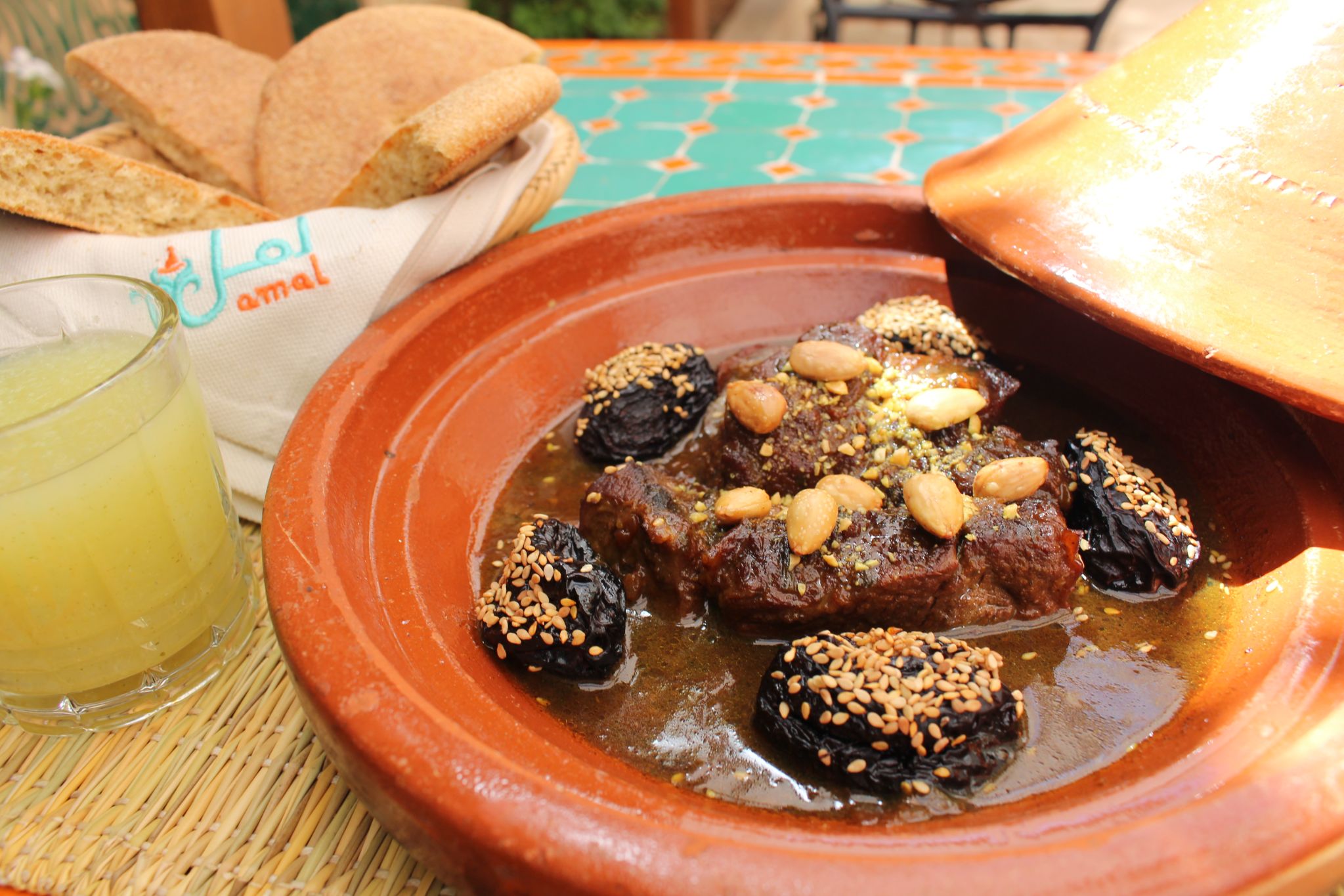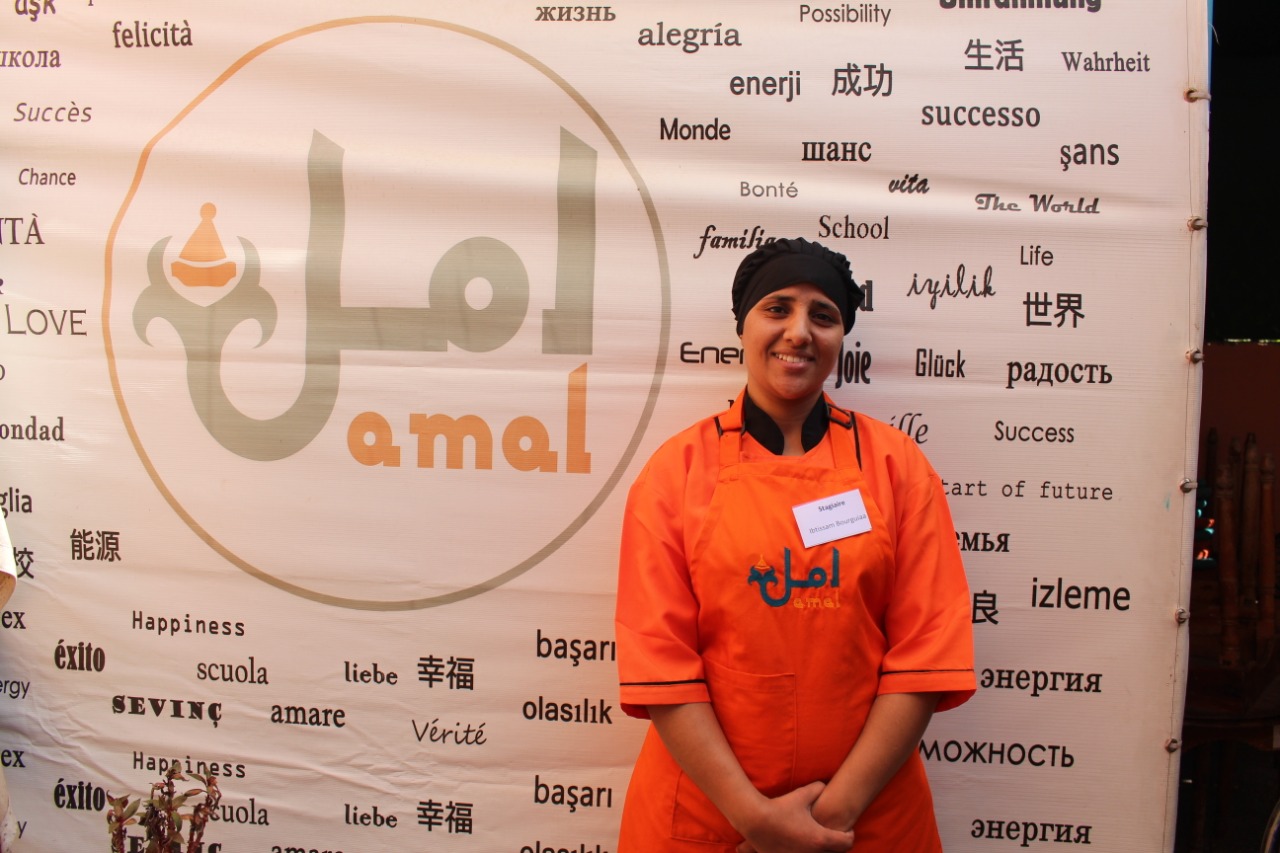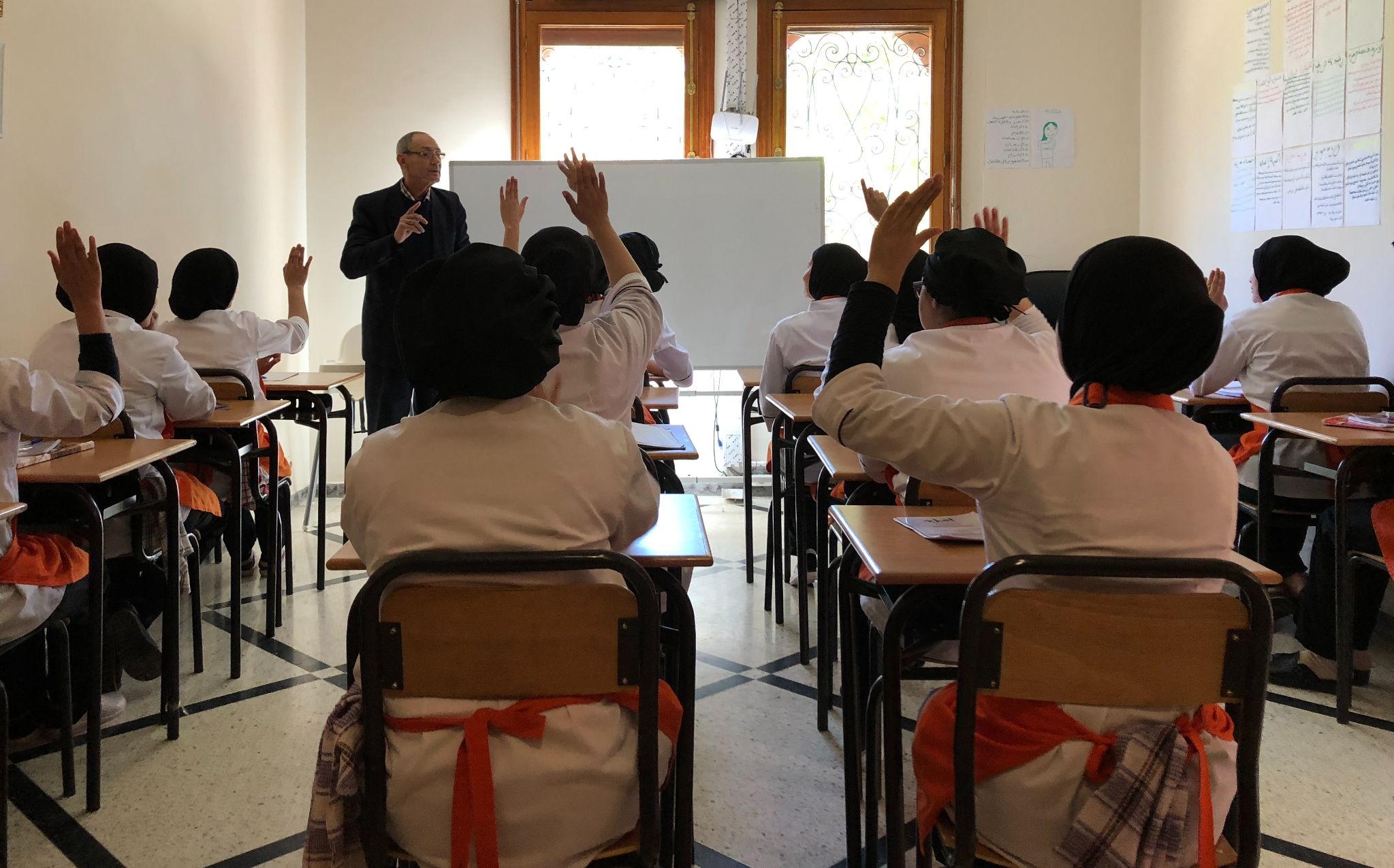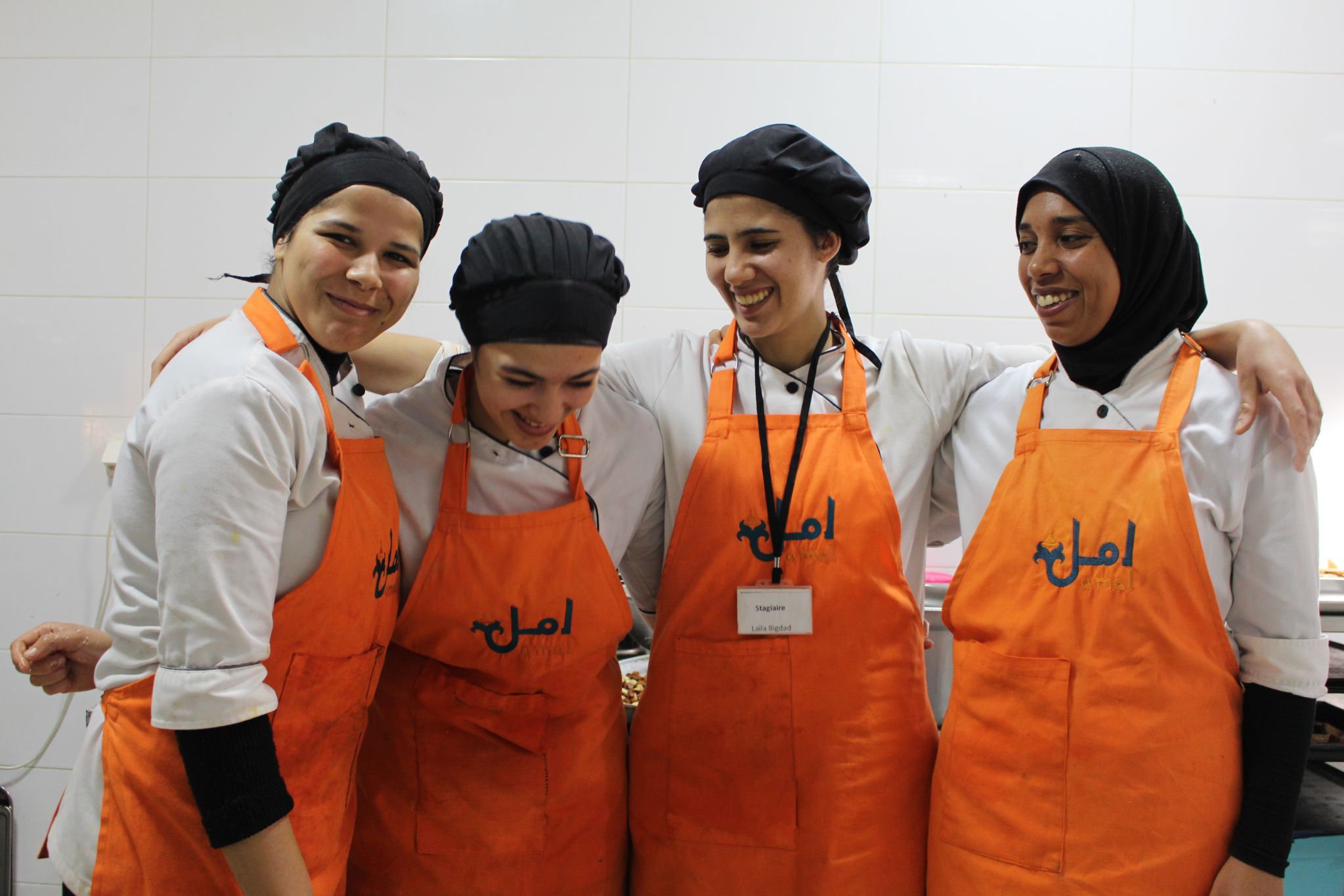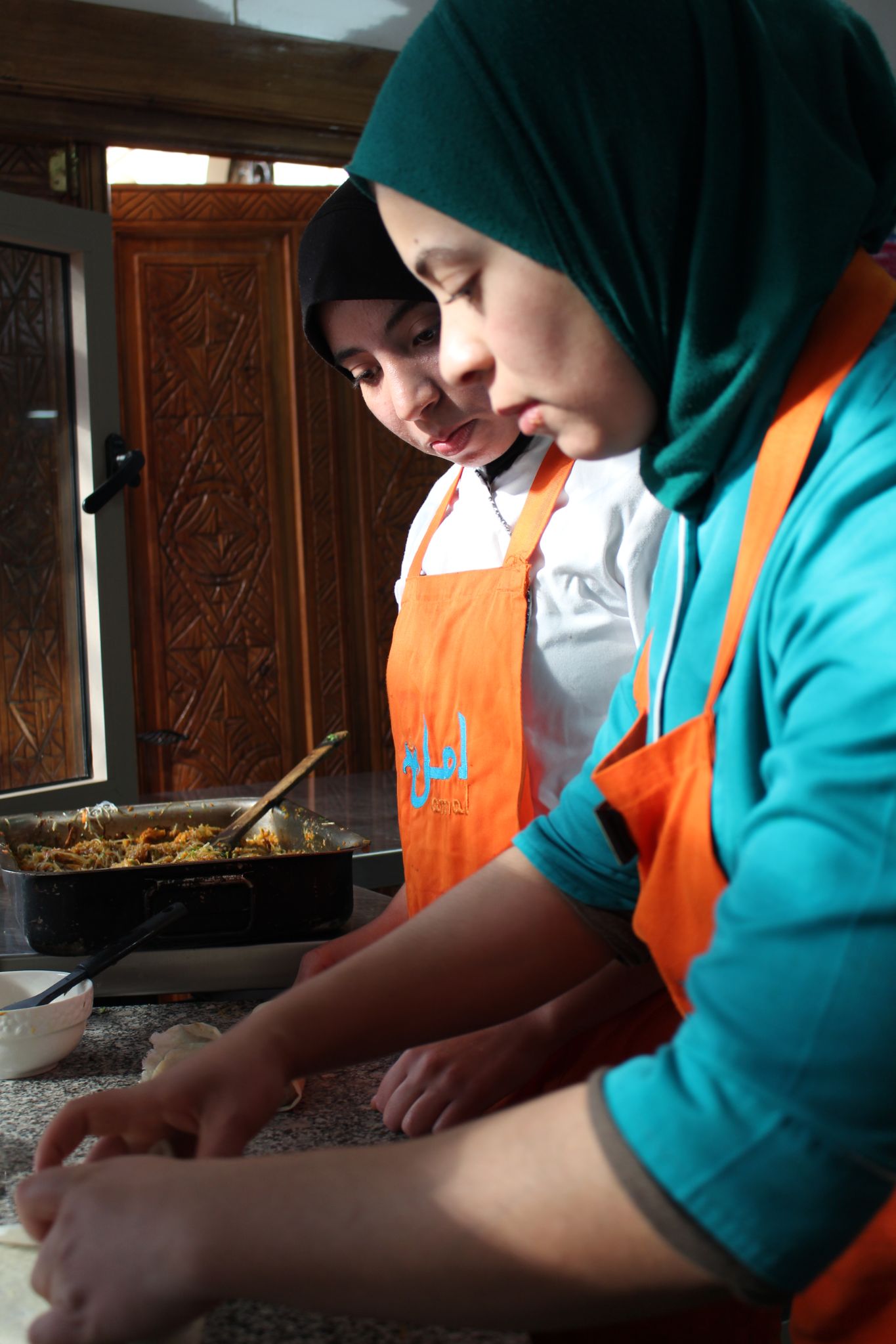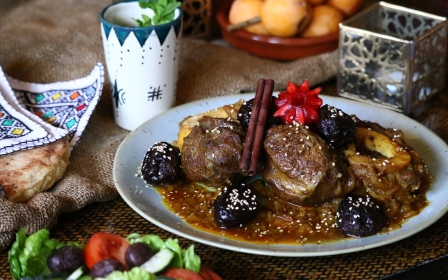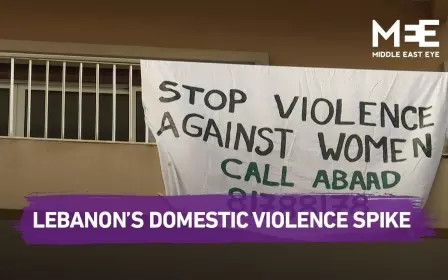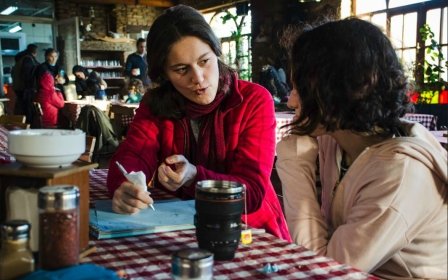Spice of life: A cookery centre in Morocco is equipping women with life skills and hope
The fragrant smell of cinnamon mixed with spices wafts out onto a busy road in Marrakech’s Gueliz neighbourhood.
The aroma is coming from a small building on the corner of one of the neighbourhood's broad streets. Behind its peach-painted stone walls and heavy wooden door, a bright courtyard is concealed, where women carry terracotta tagine pots as they serve customers seated at mosaic-topped tables.
But this isn’t just a restaurant. Inside, around 15 women take turns to prepare, cook and serve dishes of lamb tagine with couscous, hot-spiced chicken skewers and bowls of fresh salad, all under the watchful eyes of their instructors.
This is Amal, a training centre offering a six-month, intensive programme in both international dishes and traditional Moroccan cuisine to local women escaping poverty and often domestic violence. They also attend classes in maths, English and French in the restaurant's side room.
New MEE newsletter: Jerusalem Dispatch
Sign up to get the latest insights and analysis on Israel-Palestine, alongside Turkey Unpacked and other MEE newsletters
Aicha* was 29 when she discovered the centre. She remembers how she felt walking there on her first day and tells Middle East Eye: “I felt, at this age, is it still possible to learn? I was afraid. Will I be able to do this? Will it be above my level?”
The mother of two did not finish high school, believing her time in education was over. Married in her late teens, she had hoped her new husband, who is much older and a friend of the family, could provide for her.
“He saw me at a family celebration - there was a wedding. He approached my uncle. He said, 'I’m interested in marrying Aïcha.' He kept insisting. And finally, my uncle [told me that] it’s a good situation. He’s financially stable, he has a house.
“But none of those expectations turned out to be true,” she says.
She says she was physically and emotionally abused, often left without money for food for herself and their young child.
“I had this feeling [of this] societal pressure that I should stay married. Like, any kind of marriage is better than leaving a marriage,” Aicha says.
After six years in the relationship, she left. Overnight, she found herself with no income, little qualifications, single, with a toddler to feed, and six weeks pregnant.
Her father supported her for three years until her friend, who had graduated from the Amal programme, told her about the small restaurant in the centre of Marrakech that might be able to change her fortune.
Recipe for success
Amal, which means hope in Arabic, has trained over 300 women in the culinary arts since it opened in 2012. The criteria to become an Amal trainee is to be aged between 18 and 35, with no substantial income or education, but with a motivation to learn and work in the sector.
Most come to the centre through similarly difficult circumstances to Aicha - like Ibtissam, 27, who prefers to only be known by her first name, to protect her family's identity.
Ibtissam began her training in 2018. She’d completed high-school and followed it with a professional qualification in air-conditioner installation, but was unable to find work in what is a typically male sector. Her mother was sick and medical bills were mounting. The centre offered her a chance to retrain.
Nora Fitzgerald, an American-Moroccan born and raised in Marrakech, created Amal to help the women she saw struggling daily. “It was probably five years of meeting different women [in Marrakech]. I was really touched by who they were and their strength. I just started thinking to myself - what would they do if given a chance?”
'The course is a learning experience for their families - they can also see what can happen when a woman leaves a bad situation and then becomes independent'
- Nora Fitzgerald, Amal founder
Fitzgerald has always been interested in food and cooking and, as Marrakech is a popular tourist destination, she knew that there would be plenty of job opportunities for her trainees.
Once the training is complete, Amal arranges internships for each trainee, providing them with hands-on kitchen experience before they graduate to full-time employment as chefs or hospitality staff in local restaurants and hotels.
Access to education
Such an initiative is crucial in Morocco where only 21.7 percent of women are employed.
That's according to Georgetown University’s Institute for Women, Peace and Security, which compiles an annual index ranking countries on indicators of women’s domestic and financial equality. The report also details that only 16.7 percent of women are financially independent, with their own incomes and bank accounts.
“Unemployment rates are high for college-educated young women, mainly because what the International Labour Organisation calls ‘decent work’ - good working conditions, salaries, benefits - is in short supply,” Dr Valentine Moghadam, feminist scholar and professor of Sociology and International Affairs at Northeastern University, tells Middle East Eye.
“For such educated women, and indeed for women of different social classes, what is the incentive to work when the quality of working conditions are so low?”
For others, access to a basic education itself remains a challenge.
Amina El Hajjami, director of local NGO the High Atlas Foundation, says: “Not all girls and women have opportunities for education. Tradition [is one reason], as parents are worried about sending their girls to schools. Some schools are far from the students, and there is a lack of transport [...] to schools. Early marriages [are also a barrier].”
Statistics from the World Bank show that by 2018, only 64.59 percent of women over 15 years old were literate in Morocco - compared with 83.30 percent of men of the same age. The World Bank’s data also shows that for every 100 boys, only 95 girls will enrol in secondary school.
For many women in Marrakech, a training centre like Amal might be the last chance of gaining both education and skills. The centre offers literacy training as part of the course - and provides audio-taped instruction while they learn. But even after they get a place on the programme, many find that the path to employment still has hurdles.
Family concerns
Aicha’s family were not convinced she would be able to work, and were concerned about the social stigma after her divorce. This is a common issue, according to Fitzgerald: “If the woman leaves her husband and comes [to her parent’s] home alone, it’s like her value is a little bit less - and even less if she returns with children. It’s as if you’re a failure.”
But Moghadam says this can vary according to a woman’s class background.
“I know of highly educated women, with their own income, who are divorced," she says. "Working-class or lower-middle-class women might, however, be at a disadvantage because of the presence of more conservative attitudes and values in her social geographic familial circles.”
Fitzgerald now hopes to up-end this traditional view of women as existing solely within the home. “The course is a learning experience for their families - they can also see what can happen when a woman leaves a bad situation and then becomes independent.”
And that’s been the case for Aicha. Her family are now proud of their daughter. “They're saying: you're so much better off, in all ways, than when you were married. You really don't need that man or any other men,” she says.
Other women share similar stories of empowerment after leaving Amal. Zineb* was forced to work as a child labourer. She ran away and lived on the streets for a time, working odd jobs where she could.
Five years ago, a newly single mother, she discovered Amal, and now supports herself and her daughter with a stable job in the kitchen of a riad - a large traditional home turned into a hotel - in Marrakech.
Cooking up confidence
Amal gives these women - often sidelined, forgotten and marginalised - a seat at the proverbial table, in one of the best areas in town. This space, intentionally created to help these women realise their vast potential, inevitably increases the women’s confidence in themselves.
Fitzgerald says that this is greatly encouraged and cultivated throughout the course. “There's one life coaching element where they are just encouraged to talk about their life. How are they the agent of their own lives? What are their goals? How do they set them?” she says.
“I want them to feel that they are worthy of taking up space here. You're in this programme, here on this earth. You are worthy.”
Both Ibtissam and Aicha are now able to cook a wide variety of cuisines and both have paid jobs in the industry as chefs - although Aicha’s is currently on hold because of the current coronavirus restrictions. Food is, of course, a great healer - both went from under-confident and unemployed women to trained and capable female chefs.
Over six months, the pair learned hundreds of different recipes, mastering and perfecting each one before moving onto the next. “I loved everything about the training because I love cooking so much. I just couldn't wait to see what the next dish was,” Aicha says.
During one of Amal’s Masterchef competitions, designed to test the trainees’ abilities, Aicha even created her own dishes.
Her creative menu featured a crispy pate a choux to start, filled with soft ricotta, fresh chives and tuna. For the main, she created a sweet and savoury Cordon Bleu with a Moroccan twist - scattered with dried fruits and a tangy sesame honey sauce, complete with a steaming poached pear. While the dessert was a caramel flan, with biscuit topping. Unsurprisingly, her team won.
'When you work with your hands to make the dish, you kind of create this deep, personal connection with the recipe'
- Ibtissam, Amal trainee
Ibtissam, with an unbounded enthusiasm for cooking, says she could not possibly single out a favourite dish. “When you work with your hands to make the dish, you kind of create this deep, personal connection with the recipe. So, I like everything - but I cannot choose between the recipes.”
Throughout all of her training, however, Ibtissam was most proud of her apple tart. “In the beginning, it was very difficult for me to do - but I practised it a lot and eventually it worked out well. There was a customer that loved it so much, he asked for it every day,” she says.
A chance to dream
Although training at the centre has been postponed because of the coronavirus pandemic, Fitzgerald hopes it will restart soon. The crisis has had a big impact on their work. “We need an interim plan for the whole next year for how the training will work - barring some act of God, of course.”
In the meantime, Fitzgerald’s priorities lie in serving the most vulnerable in Marrakech. Their new initiative launched in March as a response to the pandemic, Hope for 1,000 families, aimed to deliver food baskets to 1,000 families who had lost an income. The baskets had enough food to feed a family of four for two weeks.
Amal’s team raised over $100,000 and has so far managed to feed more families than they expected - over 2,000 families and around 8,000 people received meals at their last count.
According to Fitzgerald, the restaurant is now open but footfall remains slow. Even while things are on hold, the difference Amal has made to the hundreds of women they’ve trained in Marrakech is clear.
“The main difference between the Ibtissam of the past and of now is that the old me never had dreams. I never cared about what the future had in store for me,” Ibtissam says.
“The new me is really hopeful and has a lot of dreams. I want to change the image of women in my society and show them that women can work.
“I felt like I was in a bubble before. After, I felt like I was reborn. I got the chance to have a new life.”
Ibtissam’s dreams are now wide-ranging and ambitious - she wants to gain a professional baccalaureate qualification in culinary arts and to open her own chicken-rearing project. And, with the salary she now earns in a kitchen, she’s been able to buy medicines for her mother, whose health has improved.
Aïcha has also allowed herself to dream since leaving Amal and hopes to open her own restaurant one day. Her aspirations for her family are simple: for her sons, eight and three, to never feel the lack of a father-figure - and to simply have a choice in what they do with their lives.
“Before I started the course, I felt like I was waiting for a bus. Everyone else had got on the bus and I was left behind,” Aicha says.
It’s apt that Aicha used the metaphor of waiting for a bus that never comes. On her first day of training at Amal, she walked for over an hour to get to the course because she couldn’t afford the fare. Much like that walk, Aicha’s journey to where she is now was long, painful, and winding.
“I almost feel as if I am the one driving the bus now,” she says.
* Names have been changed to protect identities
This article is available in French on Middle East Eye French edition.
Middle East Eye delivers independent and unrivalled coverage and analysis of the Middle East, North Africa and beyond. To learn more about republishing this content and the associated fees, please fill out this form. More about MEE can be found here.


